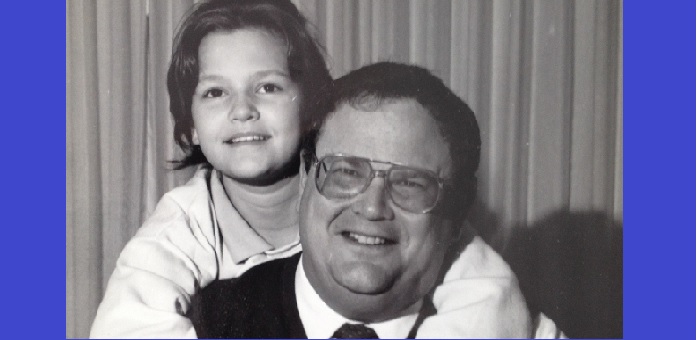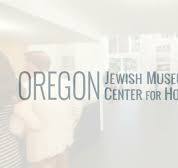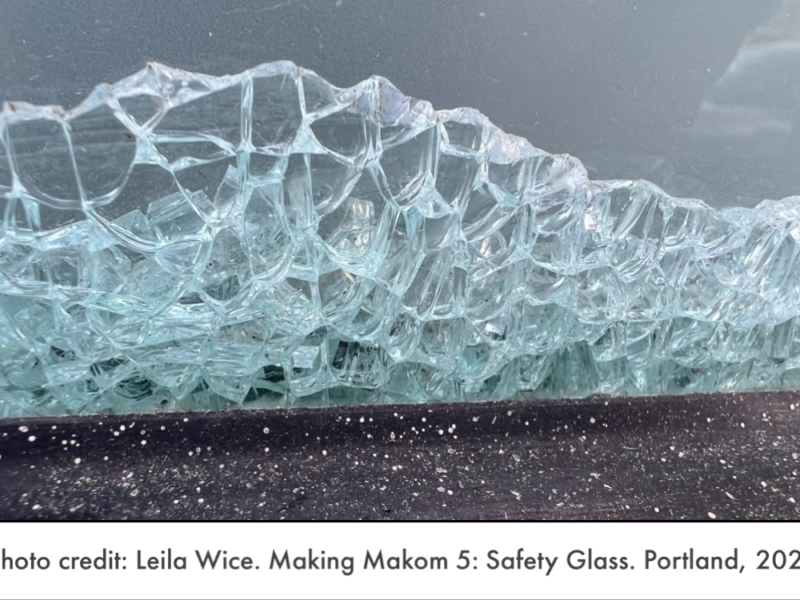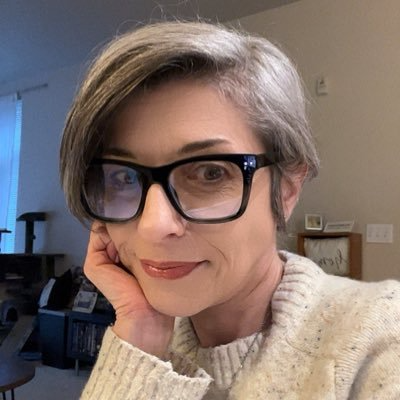
PHOTO: Nili as a child with her father, Charlie Schiffman, z”l
Nili Isenberg didn’t set out to be part of a musical movement to encourage other young Jews to appreciate Jewish prayer and attend synagogue – it was an organic occurrence.
Nili grew up in Portland, the daughter of Charlie Schiffman, z”l, who retired in 2013 after leading the Jewish Federation of Greater Portland for 23 years. Now living in Los Angeles, she is an educator, singer, Orthodox Jew, mother and more. After her father’s unexpected death in Israel in July 2015, Nili said Kaddish daily for a year.
As the prayer and a hit tune merged in her mind, she created a YouTube recording (youtube.com/watch?v=XjV08jdkK7I) of the Mourners Kaddish set to Adele’s “Hello.” By summer 2018, the recording had 135,507 views. It was featured in an article in New York Jewish Week entitled Pop Goes the Synagogue in April of this year. Writer Ted Merwin, a professor of religion and Jewish studies at Rickerson College, writes of Nili, “I can’t stop listening to the haunting and interpretive version of the Mourners Kaddish set to Adele’s ‘Hello.’ Hello from the other side. I’ve said these words a thousand times. Chanting this prayer for the thousand and first time, with a tune imported from the secular realm, reincarnates it brilliantly in a way that brings out new resonances, new associations and new meanings for our modern times.”
The article inspired me to ask Nili her thoughts on Merwin’s article and her part in what he describes as the potential bridge that pop music can build to bring younger Jews to the synagogue. The following Q&A has been lightly edited for clarity and brevity.
How did you come to record the Kaddish to Adele’s “Hello?”
I dedicated myself to saying Kaddish at least once a day for a year after my father’s passing. It was an appropriate tribute to my father, a pious man who dedicated his entire being to Judaism and the Jewish people. I loved the idea of being surrounded by a community at this difficult time and having the quiet of a minyan to reflect on a daily basis on my memories of my father.
Kaddish was running through my mind regularly, and at the same time Adele’s “Hello” had just come out and it was playing everywhere, so the two pieces came together. I made a rough recording of it late one night. I played a karaoke version of the song on my laptop and recorded the instrumental music along with myself singing on my iPad. I just wanted to share it with some friends on Facebook. After I posted it, my friends commented and praised it. The YouTube video had over 200 views!
A month later I took out my phone to check on the song, and my jaw dropped. The song jumped from hundreds to thousands and just kept climbing. I was blown away by the extent to which strangers were touched. People were dedicating the song to their relatives and friends who had passed away and finding comfort and a new connection to the prayer. I could never have imagined that it would reach so many people.
Have you taken other prayers and sung them to popular songs?
I was inspired by YouTube subscribers to put together two other songs, “Unetana Tokef” and “Aneinu,” but neither has been as popular as the first. The mix of a wildly popular secular song by Adele with a classically familiar Jewish prayer was a killer combination. Excuse my pun.
Ted Merwin suggested perhaps synagogue services based on the music of Ed Sheeran or John Legend are just around the corner.
As a model for this kind of service, Merwin turned to my Kaddish and concluded that this form “reincarnates it in away that brings out new resonances, new associations and new meanings for our modern times.” I would agree.
Could incorporating more pop melodies in the liturgy help attract the younger generation?
For me, the synagogue experience is about a lot of different things. I love going to see my friends, hear the speeches and see the synagogue’s important community work. Singing gives me the spiritual experience. If the music is old and stale, that’s a big problem for me. I don’t know if more pop melodies in the liturgy would help attract the younger generation, but I do think that people can be more inspired and connected by new melodies when the tunes fit the words.
Familiar music can be a powerful point of entry. Someone asked if this connection between secular music and religious words is sacrilegious. I’m not a musicologist, but I would expect that a scholar would say that this is something that has always been done, in any culture where Jews have lived throughout the generations.
With your gift of singing, do you have time to perform?
I try to continue singing whenever I can. It has always been a serious hobby. In college and after, I performed with a variety of Jewish a cappella groups. Now in LA, I perform musical theater with the Jewish Women’s Repertory Company. When I played Golde in “Fiddler on the Roof,” I dedicated my performance to the memory of my father, a man just like Tevye – family man, a lover of god and tradition, a leader of the community, funny with a beautiful voice and a heart of gold.
How do you balance religious practice, family, career and other activities?
Being in these productions takes a toll on my family, and it is difficult to balance everything. I especially thank my wonderful husband, Ethan, who picks up the slack. I wish I could find more time to sing, but sometimes I make do with singing along passionately at Shabbat services.
Can you reflect on growing up in Portland?
My family moved to Portland in 1987 when my dad became director of the Jewish Federation. My family was always involved in the Jewish life of the community. I feel that in my career in Jewish education, I am following directly in my father’s footsteps.
I developed my love for singing and theater in Portland. I was involved in the theater program at the Mittleman Jewish Community Center, led by Eileen Mejia, who nurtured talent and produced incredible shows. I sang with local Jewish celebrities such as Amy Shapiro and Barbara Slader – wonderful musicians, friends and mentors. I left Portland in 1995 for college at Boston University. I hear the community has blossomed in so many ways. I know my father would be proud.
Tell us about your family today.
My husband, Ethan, grew up in LA. We have three adorable sons ages 8, 5 and almost 3, who keep us very busy. Our middle child has a rare genetic condition called Angelman Syndrome, which is an additional challenge.
After my father’s passing, my mother, Marsha, came to live with us. She has been an invaluable help and support. She delights in the grandchildren. The youngest was born shortly after my father’s death and is named after him. We trust that he and his brothers will grow to uphold the legacy of their beloved Zaydie.
Do you ever feel at a loss by the restrictions placed on women within the Orthodox practice?
I attend a Modern Orthodox synagogue; women are not involved in leading the prayers, but I do feel that my voice makes a difference. I am regularly approached by people who thank me for making their prayers more meaningful.
The truth is that I have never had a desire to be a formal leader of services. As a child I didn’t even want to have a bat mitzvah; my parents eventually won out, and I ended up leading the Friday night Kabbalat Shabbat at Shaarie Torah at the time when it was more traditional, though no longer affiliated with the Orthodox movement. At the time, having a woman lead this part of the service was a serious innovation.
Today this type of pushing boundaries within Orthodoxy continues. Modern Orthodox seminaries enable women to become rabbis in Israel and America. Some Orthodox women make a career out of performing music for all-female audiences, in observance of the modesty laws that prohibit men from listening to the vocal performances of women.
I felt that making music into a career would take away all the joy. I’ve always found my community within Orthodoxy, and I have never felt restricted by the place of women, though I applaud all the progress I see being made for those who seek opportunities.
Nili encourages people to consider a donation to cureangelman.org/can/donate





